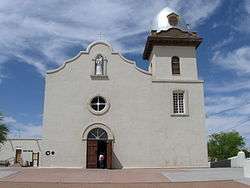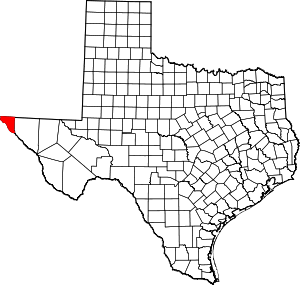Ysleta del Sur Pueblo
Ysleta del Sur Pueblo (also Tigua Pueblo) is a Puebloan Native American tribal entity in the Ysleta section of El Paso, Texas. Its members are Southern Tiwa people who had been displaced from Spanish New Mexico in 1680-1681 during the Pueblo Revolt against the Spaniards.
Tigua tribe | |
|---|---|
 La Misión de Corpus Christi de San Antonio de la Ysleta del Sur | |
 Location in Texas | |
| Tribe | Ysleta del Sur Pueblo |
| Country | United States |
| State | Texas |
| County | El Paso |
| Government | |
| • Body | Tribal Council |
| • Governor | E. Michael Silvas |
| • Lieutenant Governor | Adam Torres |
| • Cacique | Jose Sierra Sr. |
| Population (2017)[2] | |
| • Total | 926 |
| Website | ysletadelsurpueblo.org |
Tigua
In Spanish the people and language are called Tigua (pronounced tiwa). They have maintained a tribal identity and lands in Texas.[3] Spanish replaced the indigenous language in the early 1900s, and today, English is increasingly gaining ground in the community.
For almost 40 years the Pueblo has owned and operated tribal businesses that provide employment for its members and the El Paso community. These businesses include the Speaking Rock Entertainment Center, Big Bear Oil Co., Inc., and the Tigua Indian Cultural Center.[3] The tribe employs approximately 500 individuals.
As part of the Indian termination policy followed by the federal government from the 1940s through the 1960s, the Tigua became the last tribe formally terminated. They were recognized as the Tigua Indians of El Paso in 1967 as a Texas Indian tribe; House Bill 888 was passed during the 60th Legislature, Regular Session, transferring all trust responsibilities for the Tigua Indians to the Texas Indian Commission. On 12 April 1968, under Public Law 90–287 82 Stat. 93 the United States Congress relinquished all responsibility for the Tiwa Indians of Ysleta, Texas to the State of Texas. The Tiwa Indians Act specified that tribal members would be ineligible for any services, claims or demands from the United States as Indians.[4]
Public Law 100-89, 101 STAT. 666 was enacted 18 August 1987 and restored the federal relationship with the tribe simultaneously with those of the Alabama-Coushatta Tribe. The restoration act renamed the tribe to the Ysleta Del Sur Pueblo,[5] repealed the Tiwa Indians Act, and specifically prohibited all gaming activities prohibited by the laws of the state of Texas.[6] The Tigua have maintained a federal relationship continuously since 1987.
The legislation of the United States Congress restored eligibility to receive services from the federal government to this group, the southernmost tribe of the Pueblo peoples.[7] In addition, the state of Texas recognized the tribe. Two other tribes in Texas also have federal and state recognition, while an additional two tribes have state recognition only.[7] In April 2008, the Tribal Census Department reported 1,615 enrolled members.[8]
As of 2019, E. Michael Silvas is the current Governor of Ysleta del Sur Pueblo.[9]
See also
Notes
- "Tribal Council". Retrieved 2019-07-24.
- 2013-2017 American Community Survey 5-Year Estimates. "My Tribal Area". United States Census Bureau.
- Ysleta del Sur Pueblo Official Site
- http://uscode.house.gov/statviewer.htm?volume=82&page=93
- http://uscode.house.gov/statviewer.htm?volume=101&page=666#
- http://uscode.house.gov/statviewer.htm?volume=101&page=668#
- "Indian Entities Recognized and Eligible To Receive Services From the United States Bureau of Indian Affairs; Notice" Federal Register 12 July 2002, Part IV, Department of Interior, Bureau of Indian Affairs
- "About Us", Ysleta del Sur Pueblo Official Site
- https://www.ysletadelsurpueblo.org/government/tribal-council
Bibliography
- Bartlett, John R. (1909). The language of the Piro. American Anthropologist, 11 (3), 426–433.
- Diamond, Tom. (1966). The Tigua Indians of El Paso. Denver: National Congress of American Indian Funds.
- Fewkes, J. Walter. (1902). The Pueblo settlements near El Paso, Texas. American Anthropologist, 4 (1), 57–75.
- Harrington, John P. (1909). Notes on the Piro language. American Anthropologist, 11 (4), 563–594.
- Houser, Nicholas P. (1970). The Tigua settlement of Ysleta del Sur. The Kiva, 36 (2), 23–39.
- Houser, Nicholas P. (1979). Tigua Pueblo. In A. Ortiz (Ed.), Handbook of North American Indians: Southwest (Vol. 9, pp. 336–342). Washington, D.C.: Smithsonian Institution.
External links
- Ysleta del Sur Pueblo, Official Website
